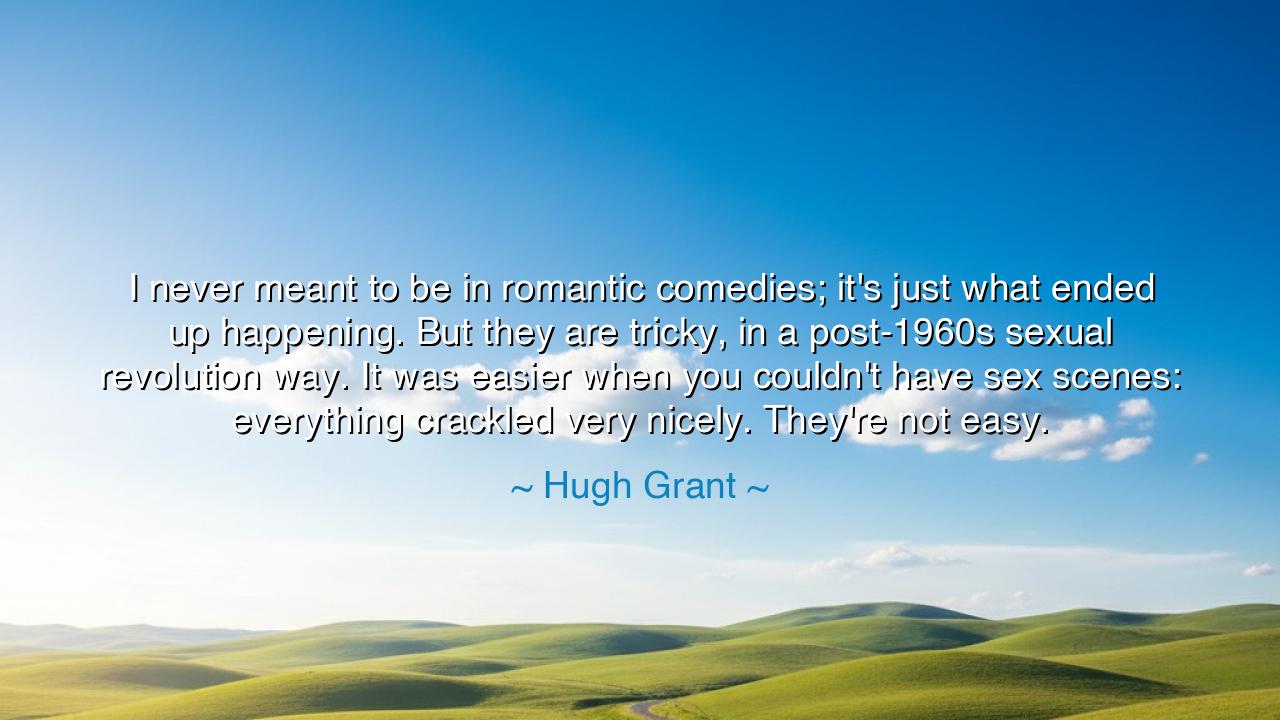
I never meant to be in romantic comedies; it's just what ended up
I never meant to be in romantic comedies; it's just what ended up happening. But they are tricky, in a post-1960s sexual revolution way. It was easier when you couldn't have sex scenes: everything crackled very nicely. They're not easy.






“I never meant to be in romantic comedies; it’s just what ended up happening. But they are tricky, in a post-1960s sexual revolution way. It was easier when you couldn’t have sex scenes: everything crackled very nicely. They’re not easy.” Thus spoke Hugh Grant, reluctant prince of the modern love story. His words peel back the veil on a genre that seems light yet is among the hardest to master. For beneath the laughter and charm lies the profound task of capturing the mystery of attraction—of showing desire and restraint, longing and hesitation—in ways that move the soul rather than cheapen it.
The romantic comedy has always thrived not on consummation but on delay. In the days before open depictions of sex, the spark came from glances, stammered words, near-touches, and silences heavy with meaning. As Grant observes, once the sexual revolution loosened taboos, much of the old tension was lost. For when all is shown, little is left to the imagination; and where nothing is withheld, the air cannot crackle with possibility. The true magic of romance lies not in the moment of fulfillment, but in the dance that leads to it—the yearning, the barriers, the obstacles overcome.
The ancients themselves knew this truth. In the comedies of Menander and later of Shakespeare, love was rarely direct. It hid behind disguises, misunderstandings, and delays. The audience leaned forward, hearts racing, not because they were watching bodies unveiled, but because they were watching souls inch toward union. In Much Ado About Nothing, the wit and quarrels of Beatrice and Benedick burn with more heat than any explicit act could convey. This is the “crackle” Grant names—the electricity born from restraint, from the energy of what has not yet happened.
Grant’s reflection also reveals the paradox of his own career. He “never meant” to dwell in romantic comedies, yet fate placed him there, and through his fumbling charm and hesitant elegance, he embodied the very tension he describes. His characters thrived in pauses, in awkward silences, in the comedy of not yet daring. He reminds us that the genre, when done well, is not frivolous at all, but delicate—an art of suggestion, balance, and timing, far more difficult than drama or tragedy, which thrive on excess.
History gives us many examples of the difficulty of love’s portrayal. In the Victorian age, novels such as Charlotte Brontë’s Jane Eyre achieved their power not through physical passion displayed, but through withheld longing, through the burning restraint between Rochester and Jane. Readers trembled not at what they saw, but at what they could only imagine. The heart was moved more deeply by absence than by presence. So too in cinema’s golden age, the great romantic comedies of Katharine Hepburn and Cary Grant flourished not by showing all, but by suggesting everything.
The lesson is clear: the greatest power in romance is not in revelation, but in mystery. To give all at once is to leave the heart empty; to withhold wisely is to leave it aching, yearning, alive. Grant’s words remind us that in life as in art, attraction is sustained not by immediate fulfillment but by the beauty of pursuit, the joy of anticipation, and the trembling uncertainty of not knowing when or if love will be returned.
Practical action flows from this wisdom: in your own life, do not rush to strip away all mystery, whether in love, work, or creation. Allow the silences to speak, allow the pauses to build meaning. Honor restraint, for it gives depth to desire and dignity to passion. The romantic comedy, when mastered, mirrors the truest form of love: a dance of souls, where each step holds tension, promise, and delight.
So, children of tomorrow, heed Hugh Grant’s teaching. Do not mistake ease for greatness, nor fullness for fulfillment. The art of romance, whether on the screen or in the heart, is never simple. It is tricky, as he says—demanding patience, timing, and restraint. But when mastered, it creates not mere laughter, but that rarest of miracles: the crackle of love, alive and eternal.






AAdministratorAdministrator
Welcome, honored guests. Please leave a comment, we will respond soon